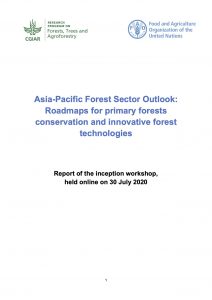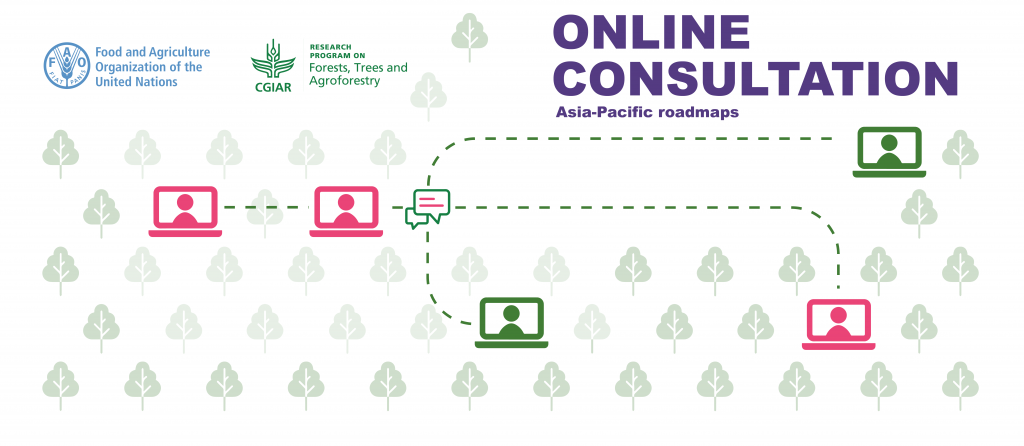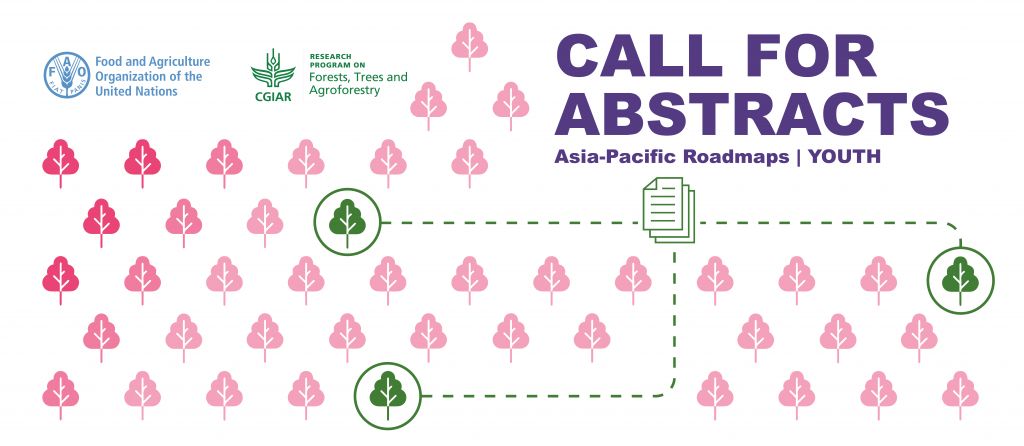Following the recommendations of the ‘Third Asia-Pacific Forest Sector Outlook Study’ (FAO, 2019)[1], FAO and CIFOR, lead center of the CGIAR research programme on Forests, Trees and Agroforestry (FTA), are developing two inter-related roadmaps for primary forest conservation, and for innovative forest technologies in the Asia-Pacific region. These roadmaps will include key recommendations (policy and concrete actions) informed by science. They will be developed through an inclusive and participative process, involving key regional stakeholders and technical experts and paying a specific attention to the contributions of students and people engaged in activities related to the forest sector in the Asia-Pacific region.
On July 30th, 2020, FAO and FTA co-organized an online inception workshop to launch this collective process with three objectives in mind: (i) agree on the global direction of the two roadmaps; (ii) identify potential contributors; (iii) start building a strong community around these roadmaps to ensure a large participation to the process. The workshop combined plenary sessions with parallel sessions in smaller breaking groups (seven groups of 8-10 persons each) with the view to ensure both inclusiveness and active participation.
The workshop attracted a wide and diversified audience, representative of the key stakeholder groups in the region (international organizations, governments, private sector, civil society, research and academia).
The first session, devoted to primary forest conservation, was the occasion to discuss the main threats facing primary forest conservation, among which: climate change and natural disasters; population and economic growth; overexploitation and illegal exploitation of forests; conflicting land uses; inconsistent policies across sectors and scales; corruption, weak governance, migration and conflicts. Participants in the workshop identified many ‘hotspots’ for primary forest conservation and suggested for the roadmap to develop a list of criteria that could help describing and mapping these hotspots across the region and contribute to prioritize conservation efforts. Among such criteria were mentioned: size, level of threats, as well as richness and uniqueness of the ecosystem (considering its environmental, economic, social and cultural values).
Participants recommended to adopt an integrated, cross-sectoral, multi-stakeholder forest governance, articulated at all scales. Remnant primary forests should be considered within the broader landscape, taking into account the dynamics at stake in surrounding areas (e.g. planted forests, agricultural land, infrastructures and human settlements) that directly or indirectly impact primary forest status and trends. Among the institutional challenges for primary forest conservation, participants highlighted: the accurate monitoring of primary forest values; the sustainable funding of forest conservation; the importance of education and capacity building; the effective enforcement of existing laws and rules.
During the second session, the following categories of innovative technologies appeared as the most promising for sustainable forestry and sustainable forest management: ICTs/digital technologies; low-carbon technologies; biotechnologies; and emerging finance technologies. Most participants shared the feeling that innovation benefits will outweigh the risks. Innovative technologies can provide new products and services; generate further income and employment opportunities in the forest sector; and, by reducing waste, enhance the sustainable management of natural forest resources. However, the negative impacts of new technologies on local communities – including in terms of access to natural resources, food security, employment and livelihoods -, on natural ecosystems and on biodiversity should not be overlooked. In particular, the adoption and dissemination of innovative technologies will likely produce a shift in the labour market: generating new skilled job but destroying unskilled jobs and marginalizing traditional practices.
Among the main barriers to uptake and upscale of technologies, participants identified: (i) the lack of capacity (infrastructures and equipment, human capital and financial resources); and, (ii) restrictive policies and regulations lagging behind the rapid evolution of technologies and the rapid shifts in wood demand. One of the major challenges will be to “scale-down” innovative technologies and adapt them to each local context, so that they can also benefits to traditional users, smallholders and local communities. Participants agreed that regional cooperation, investment, infrastructure development, education and capacity building will be key to overcome these barriers, support technology transfer and dissemination, and accompany the populations at risk of being marginalized by these technological advances. They highlighted the importance for the public and private sectors to work hand-in-hand to address these issues.
Consumers have a lot of power for orienting the forest sector towards sustainability. Consequently, these roadmaps should contribute to raise consumer awareness on the two topics discussed during this workshop.

The workshop report presents in more details the discussions and the main results of the workshop.
During the workshop, participants demonstrated their high level of interest and enthusiasm for the two topics discussed. This raises high expectations regarding the outcomes of this collective process. Thomas HOFER, Senior Forestry Officer in FAO Regional office for Asia and the Pacific (FAO-RAP, Bangkok), thus invited all participants to maintain their level of engagement in the coming months and to contribute actively to the work ahead with innovative ideas, out-of-the-box thinking and a forward-looking perspective, in the spirit of the ‘Third Asia-Pacific Forest Sector Outlook Study’.
At the end of the workshop, Vincent GITZ, FTA director, presented the next steps of the collective process of development of the two roadmaps.
After the workshop, the scopes of the two roadmaps were refined, based on the comments received.
The two revised scoping notes can be downloaded here
In the coming months, FAO and FTA will invite further contributions to the roadmaps through different channels: (i) direct interviews of selected key regional stakeholders; (ii) an open online consultation; and, (iii) an essay competition for students and young people engaged in activities related to the forest sector in the region. Following this inception workshop, additional technical workshops will be organized as appropriate, at critical stages of the process.
The open consultation was framed based on the suggestions received during the workshop. It aims at collecting scientific and local/traditional knowledge, experience and best practices, views and perspectives, suggestions and recommendations on primary forest conservation and on the application of innovative technologies in forestry and forest management in the Asia-Pacific region.
The consultation is open till November 15th, 2020 NOW EXTENDED UNTIL 15 DECEMBER!
Participate to the Online Consultation!
Young people will be the managers and decision-makers of tomorrow. They have shown their capacity to generate and spearhead trans-national mobilization to address environmental challenges, such as climate change, and advance sustainable development. They can be instrumental in shaping a sustainable future by taking leadership roles and generating momentum through collaboration and social media, and by transforming rigid institutions from within and participating to the uptake and upscale of innovative technologies in the forest sector.
This is why FAO and FTA decided to organize a competition to encourage contributions from students and young people engaged in activities related to the forest sector in the Asia-Pacific region. Youth are invited to share their experience, expectations and recommendations regarding the use of innovative technologies to advance sustainable forest management in Asia and the Pacific. This competition will take place in two steps: (1) call for abstracts, (2) development of the selected contributions.
The call for abstracts is open till November 15th, 2020 NOW EXTENDED UNTIL 15 DECEMBER!
Youth from the Asia-Pacific are encouraged to submit their abstracts!
The main findings and recommendations of the two roadmaps, as well as the best youth papers, will be presented and discussed during a regional multi-stakeholder workshop possibly organized back-to-back to the XV World Forestry Congress to be held in Seoul, Republic of Korea (24-28 May 2021).
The final objective is to publish the technical paper and the corresponding policy brief by end November 2021.
[1] FAO. 2019. Forest futures – Sustainable pathways for forests, landscapes and people in the Asia Pacific region. Asia-Pacific Forest Sector Outlook Study III. Bangkok. 352 pp. http://www.fao.org/3/ca4627en/ca4627en.pdf
This article was produced by the CGIAR Research Program on Forests, Trees and Agroforestry (FTA). FTA is the world’s largest research for development program to enhance the role of forests, trees and agroforestry in sustainable development and food security and to address climate change. CIFOR leads FTA in partnership with Bioversity International, CATIE, CIRAD, INBAR, ICRAF and TBI. FTA’s work is supported by the CGIAR Trust Fund.













